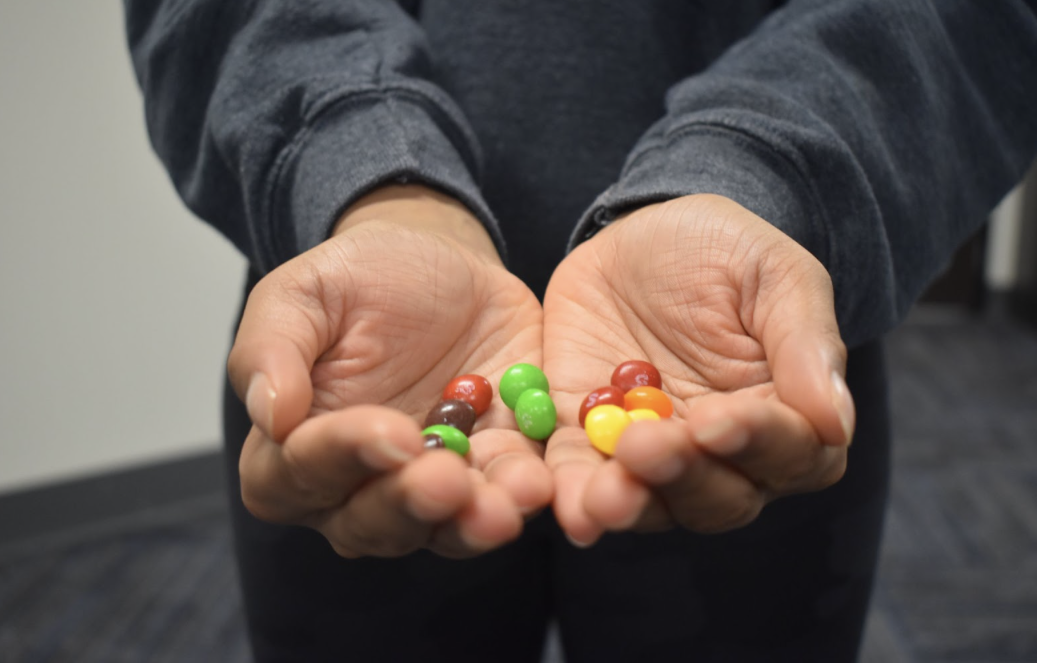Disclaimer: This article mentions diet culture, mental illness and eating disorders.
It is as simple as “normal” actions: a teen finishing their plate when they are already full, encouraging a child to eat their vegetables in exchange for candy later, holding off from breakfast and lunch, then eating everything in the kitchen at midnight. Most people would not bat an eye at these actions — after all, everyone knows bribery is the way to a kid’s heart, and “quirky” midnight cravings are a typical part of life . . . until they are not.
At one point or another, almost everyone has to learn one of the most important skills in human development: eating. However, many influences, including parents, socioeconomic status and diet culture, all significantly impact a person’s journey to maintaining healthy eating patterns.
Out of a variety of factors, parental influence has — more than the media, more than their tastes, more than a favorite character on a cereal box — the largest impact on a child’s ability to grow up with intuitive eating skills. Intuitive eating, or the awareness of one’s hunger cues and nutrition needs, is imperative to growing a healthy relationship with food while in adolescence. In addition to eliminating the destructive mindset that some foods are “bad” and some are “good,” intuitive eating focuses on the body’s innate ability to determine which food type is needed at the moment.
Regarding dietary habits, children are more likely to follow the patterns of their parents, which means that when a parent exhibits a certain skill, like having a weekly family barbeque or baking homemade bread, their children are more likely to pick up on those habits as well. While parents serve as important role models for their kids in all areas of life, their influence is especially significant in healthy eating during youth, as these skills can become harder to change later on. Kids look to their parents; when there is a lack of home cooking, there is also a lack of teaching the children how to cook their food. According to KidsHealth, household cooking provides kids with the practice for math, language and reading skills and creates a foundation for healthy eating habits. Activities like these lay the foundation for a positive, intuitive mind-to-stomach connection. Additionally, working with children from a young age to reinforce intuitive eating skills makes them less likely to make destructive eating choices later in life, whether those choices be from parental or outside influence.
Especially in the United States, companies with external influence continuously market unhealthy food to receptive, vulnerable children. Neophobia, or the fear of attempting new things — in this case, foods — also contributes to this issue, resulting in babies and adolescents typically favoring recognizable, starchy and carb-filled foods over unfamiliar foods such as fruits and vegetables with unique tastes and textures. Hence, when a child sees a brightly colored box with familiar foods and a favorite movie character, they are much more likely to choose unhealthy over unfamiliar. This can create an unhealthy relationship with food, leading to eating disorders, obesity and other health issues resulting from lack of nutrition.
Although there are many reasons why eating disorders can develop in the adolescent years, eating habits encouraged throughout childhood can vastly affect adulthood eating habits. After all, almost everyone has heard the common phrase “you have to eat everything on your plate before you can have dessert” from their parents. And while this may seem like a normal part of childhood, even small or normalized phrases like this can morph into much deeper misunderstandings with bodily cues.
By encouraging children to eat everything on their plates in exchange for sugary treats, parents instill the idea that dessert is a coveted reward. In contrast, more nutritious foods are treated as an unwanted roadblock. This reward system often creates the opposite effect than desired — kids become more likely to reject vegetables in favor of desserts. Rather than learning to satisfy a craving for a specific food at once in a healthy portion, kids may grow up to develop binge eating disorders and a lack of perceived control over their eating habits. When people learn from a young age that all food on a plate must be eaten, they may later experience issues with being unable to detect important fullness cues.
Not only do these parental phrases make nutritional food look bad, but they also force kids to eat everything on their plate in larger proportions regardless of the actual fullness of the child. Parents, while mostly unintentionally, ingrain specific eating behaviors into children from a young age, teaching them to ignore how their body responds to food portions rather than guilting them into eating everything on the plate with phrases like “there are starving children in Africa.” Guilt is a powerful tool, and it should not be used to make children feel bad about their eating habits. Comments like these encourage children to ignore their intuitive eating skills, setting them up for a lifetime of eating disorders and confidence issues.
Binge eating disorders, while less widely recognized as other eating disorders such as anorexia or bulimia, are incredibly dangerous to emotional and physical well-being. Binge eating disorders are characterized by episodes of uncontrollable eating far past one’s typical capacity for food. These episodes can happen after periods of holding back from eating, creating a cycle of hunger and overeating. Binge eating disorder effects such as mental illness and cardiovascular disease are the exact types of disastrous consequences that can result from parental urges to ignore intuitive eating signals.
From enticing young kids with a reward system of “good” and “bad” foods to discouraging the utilization of intuitive eating, many parental actions have a real, lasting effect on children not just in their youth but throughout the rest of their lives. All of these factors — guilt, eating disorders and parental control — have a role in the upward trajectory toward serious health problems, including obesity, depression, anxiety and even death; unhealthy eating has consequences outside of just weight gain. With obesity rates on the rise, it is easy to fall into the trap of believing that unhealthy eating habits only affect those with outward, visibly-noticeable effects. Poor nutrition habits can often lead to preventable medical conditions like Type 2 Diabetes, heart disease and chronic conditions that make it easier to develop certain types of cancers, all without necessarily changing the number on a scale. In one such case, a boy from the United Kingdom — of typical BMI and weight for someone his age — went blind after following an extremely unhealthy diet.
On the other hand, some parents approach food with a diet culture perspective, teaching their children that being skinny is desirable above all else. This can range from family members’ frequent, unnecessary comments on adolescents’ bodies during times of growth to unhealthy discussions of fad dieting around impressionable children. There’s a line between being aware and mindful of healthy eating habits and nitpicking, which parents who subscribe to toxic diet culture often end up crossing.
These parents instill a different belief set into their children, one that can lead to anorexia and bulimia. Teens raised with these beliefs often base their value on a number on a scale rather than personal accomplishments, morality and emotional intelligence. Instead of focusing on self-worth and growth, these teens fall into disordered habits such as spending excessive amounts of time at the gym, eating less food and tracking every fluctuation in weight. To outsiders, these habits may look like those of a healthy, bodily-aware person, but in actuality, this constant state of strict self-monitoring causes teens to exist with a one-track mindset, stuck in limbo between a fulfilling life and a calculated routine.
Additionally, those with certain eating disorders hyper-fixate on body image, letting physical appearance gain precedence over their health and eating styles. Many people who struggle with positive body image may look at an aspect of themselves — the stomach, arms, muscles, legs or even parts like the nose, hair or skin — and find a need to make that part of themselves perfect. They find faults in themselves extreme enough to cause emotional distress or anxiety; either way, parents who prioritize diet culture over their child’s mental well-being are setting up their child for constant dissatisfaction with their body.
However, it is not just parents that enforce these ideas. When highly-respected celebrities demonstrate behaviors in line with toxic diet culture, it becomes all too easy for parents to excuse pushing these views onto their children and for children to absorb these practices into their own lives. A parent’s influence is to a child as a celebrity’s influence is to society; essentially, a celebrity is always in the public eye. Their actions — whether good or questionable — are bound to be replicated by those who idolize them. So as celebrities make a single Instagram post advertising a new “Amazing, 100% Effective Miracle Diet” for a few thousand dollars from a diet company, people all over the world see their role model suggesting unhealthy eating habits and view those habits as a necessary change to their lifestyle, further promoting a more widespread societal version of disordered eating, also known as diet culture.
This mindset is even seen in well-known public figures such as the Hadid family. The term “Almond Mom” was coined by teens across social media after a clip of Yolanda Hadid, the mother, telling her daughter Bella Hadid to eat a couple more almonds when Bella admitted to feeling weak from only eating half of an almond. Regardless of age, upholding dangerous ideals of eating next to nothing is incredibly detrimental to those who idolize these celebrities.
Children, who widely learn through behavioral modeling, are vulnerable to falling into this mindset by copying the behavior of their celebrity role models. Modeling is a tactic used by children — and adults — to observe and replicate behaviors. Whether it be celebrities or parents, modeling the rejection of diet culture and embracing intuitive eating leads to a stronger sense of self in adolescence. By keeping these varying factors in mind while children are around, parents more effectively ensure their children will be properly nourished and feel confident in their eating abilities.
When discussing eating patterns, it is also necessary to recognize situations in which both a child and their parents have limited control over their socioeconomic circumstances, which can determine the ability to eat a nutritious, fulfilling meal. The blame cannot be fully pushed on parents when the current economic environment makes it difficult to buy healthier foods. Some blame must be placed on the economy: socioeconomic status directly impacts relationships with healthy food.
Not only are healthier foods more expensive than the junk food in gas stations and fast-food restaurants, but food deserts — areas often of lower-income populations with limited access to affordable, fresh food and grocery stores — can also cause poor eating habits in children as well. Some people in food deserts or those who live in poverty might struggle to feed their kids, regardless of the nutritional value. These kids may learn to silence their hunger, thus negatively impacting eating, which can further influence their perceptions of healthy eating patterns.
Because of increased food prices, few solutions are applicable to the common consumer; instead, focus should be placed on taking steps to make food a more body-positive experience. While there are a multitude of factors contributing to eating disorders and low self-confidence in teens, there are also a multitude of readily-available solutions to help impact how food is viewed in society.
Because teens are much more prone to eating disorders than any other age group, parents must prepare children for the societal pressure that comes with growing up to ensure that they will develop healthier eating habits and be less likely to develop body insecurities and disorders.
Taking specific steps to create a healthy relationship with body image improves the physical and mental state of the body. Three main points made by the CDC aim to reflect, replace and reinforce eating habits. Reflecting on food habits by tracking consumption for two to three days provides a better understanding of which habits need to be replaced; however, these habits cannot be instantly changed in one day. To truly change habits in the long run, one must continually reinforce the new habit and maintain self-check-ins periodically to ensure that progress is on track.
Although these steps that undo bad eating habits may be successful, it is easier to eliminate the option for these bad eating habits at the source. To do this, adults must use less negative language when discussing their child’s body and their own and attempt to focus on healthiness more than a particular number on the scale. So, rather than commenting about finishing a plate or comparing one child’s eating habits to another, adults should encourage children to listen to and follow their hunger cues.
It is imperative that children learn to understand intuitive eating while growing into adulthood, both through correct parental language and regarding diet culture as dangerous rather than attention-worthy. Taking these actions will not only ensure that children grow up to have a positive body image, but they will also keep them safe from deadly dieting.






![Latin students pose for a group photo in front of historical ruins in Italy. From March 13 to March 23, the Latin department traversed cities in Italy to immerse students in an educational experience of a lifetime. “I enjoyed being able to learn about the different cultures. [The trip] encouraged me to see other peoples lifestyle and learn more about different histories,” senior Suraiya Saroar said.](https://pwestpathfinder.com/wp-content/uploads/2024/04/PXL_20240318_092633493.jpg)
![From Jan. 22 through Feb. 1, Parkway West High is displaying a wide array of art pieces made by students ranging from elementary to high school. All classes were represented on the displays in both the art wing and the main foyer of the school. “[Art] benefits me because in the middle of a busy day. I can just relax and have some fun doing art and it makes me happy. I think its important that you show art in the art show so that people can get inspired by it and be inspired to create their own pieces; it’s really impactful,” sophomore Dhiya Prasanna said.](https://pwestpathfinder.com/wp-content/uploads/2024/02/image1-1200x800.jpg)





![Moviegoers smile for a picture after watching the Bollywood movie “3 Idiots.” The event ran from 4-8 p.m. on Saturday, March 9 and was open to students across the Parkway School District. “I decided to come to the movie night because I wanted to introduce my non-Indian friends to the rich culture and entertainment of Bollywood. One of my favorite parts [of the night] was the combination of [the] amazing food and the pure comedic entertainment. [It] was unmatched,” sophomore Aryan Allu said.](https://pwestpathfinder.com/wp-content/uploads/2024/03/IMG_5479-e1710180016483-1200x900.jpg)
![Senior Kylie Secrest volunteers at the blood drive signup table.The table provided students aged 16 and up with information about the drive and assisted them in the signup process. “We decorated the stand in the lunchroom with heart related or red decorations from either Dollar Tree or Five Below,” Secrest said. “This year was my first year doing [the blood drive] and it was fun. I got to be able to meet new people and help out the community.”](https://pwestpathfinder.com/wp-content/uploads/2024/03/image2-1200x800.jpg)


![Smiling widely, Principal John McCabe congratulates English teacher and English Department head Shannan Cremeens on winning the 2023-2024 Teacher of the Year title. Sophomore Cooper Oswald was a witness to the celebration. “We were all pretty excited. We were all clapping and standing up. We even [got to] take a picture with her,” Oswald said.](https://pwestpathfinder.com/wp-content/uploads/2023/12/TOYvertical-1200x954.png)
![Standing in front of the American Sign Language program’s mural, junior Brooke Hoenecke signs with freshman Darren Young. Hoenecke began cadet teaching for ASL this year alongside working towards earning her seal of biliteracy. “I was in ASL class when I received the email [that I qualified for the seal]. I was jumping up and down with my teacher and the rest of the class. One of the reasons why I took cadet teaching this year was so that I could prepare for the Seal of Biliteracy and be immersed in ASL,” Hoenecke said.](https://pwestpathfinder.com/wp-content/uploads/2024/05/hoenecke.jpeg)
![With a keen eye for detail, senior Natalie Lashly writes her signature onto the senior hand wall. After some encouragement from her friends, Lashly applied to make the hand wall with her Lorax-inspired design. I thought the [bright] colors would be fun. Our quote on the wall is Let us grow,’ based on the Let it grow song [from the movie]. [I was hoping that the design would] make the cafeteria feel more exciting, Lashly said.](https://pwestpathfinder.com/wp-content/uploads/2024/05/DSC_0099-1200x801.jpg)
![Walking onto the field, freshman Erastus Adewusi wears a pink jersey in remembrance of cancer awareness month. With the number seven on his jersey, Adewusi reflects on his life in Nigeria before moving to America. “I [used to wake up] at 5:30 a.m. and school would end at 5 p.m. [versus] now,” Adewusi said.](https://pwestpathfinder.com/wp-content/uploads/2024/05/DSC_0029-1200x800.jpg)

![Envisioning a cathedral in his mind, senior Soren Frederick puts pencil to paper and practices a rough sketch in the drawing room. Frederick grew up surrounded by a family of artists who helped him realize his passion for drawing and painting as he matured. “My family [is] very much [an inspiration] for drawing and painting. [Art] didn’t start [in the family] with me; it started with my mom and my older sister, and my older brother is very good at drawing [too],” Frederick said.](https://pwestpathfinder.com/wp-content/uploads/2024/05/DSC_0017-1200x800.jpg)
![Junior Amelia Geistler poses with her aunt, uncle and cousin. Moving through childhood, Geistler learned that having parents with a different appearance from her meant facing awkward, upsetting situations. “Something I faced [after] being adopted was that I was [treated] better when people discovered I had white parents. A childhood memory [is] when I went over to a friends house for the first time and her parents seemed to be very passive-aggressive, but when they learned I was adopted by white parents, they gave me equal treatment and ‘love’ as their white daughter,” Geistler said.](https://pwestpathfinder.com/wp-content/uploads/2024/04/Screenshot-2024-04-30-7.54.03-AM.png)
![Business and personal finance teacher Evan Stern stands in front of his classroom. After facing hardships growing up, Stern learned how to deal with them with the help of role models like his dad. “We dealt with some trauma when I was in middle school, and my dad had to be responsible for all three of us while he was working full-time. I know he had to sacrifice a lot. Im sure it was really hard for him, but looking back on it, he did a really good job . I didnt appreciate everything that he did at the time because I was so young. Now, Im engaged and probably going to have kids of my own in the next couple of years so I [am starting] to look at things differently,” Stern said.](https://pwestpathfinder.com/wp-content/uploads/2024/02/Untitled-7-1200x900.jpg)
![Holding his two smiling daughters in his arms, Principal John McCabe celebrates earning his doctorate degree. He attended Maryville University for two years and reached his goal of achieving a Doctor of Education: Educational Leadership degree after months upon months of hard work and long nights. “Im not going to lie, Im glad I have another night of my life back when Im not at school till very late,” McCabe said. “I can spend more time with my family and with my friends [who] are here at [West]. Im really happy about that.”](https://pwestpathfinder.com/wp-content/uploads/2024/01/mccabefeature.png)
![Art teacher Katy Mangrich sits in her classroom, smiling for a picture. During her time in high school, Mangrich learned several lessons that she now passes on to her son. “The biggest life lesson that I learned is honesty. I wouldnt say I was the best teenager, but I learned very quickly in high school to always be forthcoming and honest with my parents because it always ended up serving me better in the long run. [My parents] might have been upset with me [and the mistake I made], but I wasnt going down the rabbit hole of a lie because that was just going to get me into more trouble,” Mangrich said. “I passed [that lesson] along to my nephew. Honesty is always your best approach; just don’t lie. I say that to my son all the time. Theres no advantage to lying, [and] thats a huge takeaway [from] how my parents raised me.”](https://pwestpathfinder.com/wp-content/uploads/2024/01/Screenshot-2024-01-26-10.10.12-AM.png)
![Social studies teacher Aaron Bashirian smiles in front of his classroom. Bashirian didn’t know he wanted to be a teacher from early on, but he found the choice to be a good one. “I started [teaching] because there was an opportunity for me to experiment with it. Fortunately, [teaching] was a good choice. In 2012, I became a teacher at Parkway at the Alternative Discipline Center, which is where they send suspended kids to keep being educated if they choose. I spent six years there and then I got drafted to West, [where] Ive been for about six years,” Bashirian said.](https://pwestpathfinder.com/wp-content/uploads/2024/01/Untitled-35-1200x800.jpg)
![English teacher Angela Frye stands behind her desk in her classroom. Frye went through a lot of personal struggles to get to where she is today, and with each step in her life, she carries her gratitude for those obstacles. “Everything happens for a reason. I believe in [the concept of] good energy, good karma, [from] being a good person. Those are things I dont take lightly. [Struggles] build character. You really appreciate everything you have when you have to work for everything you have,” Frye said.](https://pwestpathfinder.com/wp-content/uploads/2023/11/Untitled-8-1200x800.jpg)
![English teacher Leslie Lindsey smiles for a photo behind her desk. Growing up, Lindsey participated in many things outdoors, learning life skills that she still uses today. “I loved fishing and was never grossed out by it. I could get my hands dirty and spend time outside; even when it was cold, I didnt care. Fishing takes a lot of patience, and that is [now] a virtue of mine because I have great patience that translates into my classroom,” Lindsey said.](https://pwestpathfinder.com/wp-content/uploads/2024/04/IMG_6632-1-e1712758336310-1200x983.jpeg)




![Since the Supreme Court’s repeal of the federal law protecting a women’s fundamental right to abortion, many states have begun to restrict access to or even ban abortion. On June 24th, 2022, Missouri was one of many states to move to ban abortion. “Missouri is giving fetuses more rights than humans who’ve been on this world for many years. If someone [wants] to have an abortion because of whatever [reason], it should be their choice. You dont know why theyre in that position and you dont know why they need an abortion,” senior Mars Allendorph said.](https://pwestpathfinder.com/wp-content/uploads/2024/05/Bang-1.png)
![Company marketing for gifts and cards during Mother’s Day and Father’s Day depicts the differences associated with the holidays. In order to capitalize on profit, large companies often include stereotype-reinforcing marketing behind parental celebration products: Mother’s Day sales typically prioritize jewelry and clothing, complete with heartfelt messages about childcare, while Father’s Day gifts tend to illustrate the father in a less serious, paternal light. “In terms of emails around those holidays, I typically get more Mothers Day [marketing] from florists or from whatever places Ive shopped at online. I tend to see more in terms of advertising and marketing,” English teacher Casey Holland said.](https://pwestpathfinder.com/wp-content/uploads/2024/05/Untitled-design-11.png)
![Frequent school shootings across the United States and subsequent lack of action have led to a chronic state of fear for many students. Recent mass shootings in schools created a new risk for students. “I’m constantly anxious about school shootings. The idea that it could happen and the prevalence of [school shootings in America] is scary. Whenever alarms go off in the school, I fear that [a shooting] might happen,” senior Carlee Priem said.](https://pwestpathfinder.com/wp-content/uploads/2024/05/Add-a-heading-27.png)
![Like many students, sophomore Medina Nanic experiences pressure to do well in school. Through continuous success and achievements, West has developed a high academic standard for students. “Because we’re seen as one [of] the better schools, we have higher standards than the [schools] who aren’t ranked as high. There’s a lot of pressure on students to do [well] and live up to those standards,” Nanic said.](https://pwestpathfinder.com/wp-content/uploads/2024/05/DSC_0029-2-1200x800.jpg)
![In the 1950s, the first recorded spikes in global temperatures were recorded, and ever since, Earth has been in the midst of a disastrous climate crisis, as rising temperatures wreak havoc on susceptible regions and destroy animal habitats worldwide. Junior Nidhi Pejathaya helped found West’s Sustainability Council to create a space where students can educate themselves about climate change and do their part to preserve the environment. “When youre going out of your way to recycle [or] reuse your clothes to save water, youre saving people. Youre saving adults, youre saving families, youre saving children. Youre saving a whole generation. Just because we dont see it doesnt mean its not happening,” Pejathaya said.](https://pwestpathfinder.com/wp-content/uploads/2024/04/new-editorial-feature-1200x800.jpg)









![Rested against a rainbow of colored pencils, a phone plays singer-songwriter Gracie Abrams’ single “Risk.” Abrams released the song as the lead single to her upcoming album “The Secret of Us.” “We had real, true fun writing this album. There were also the occasional tears. Audrey [Hobert] and I wrote ‘Risk’ on our couch at home,” Abrams wrote on Instagram.](https://pwestpathfinder.com/wp-content/uploads/2024/05/DSC_0009-2-1200x800.jpg)










![2023 was defined by female vocalists such as Miley Cyrus, Taylor Swift and Paramore’s Hayley Williams as their diversity and talent amongst their respective genres topped the musical charts. Williams took to Instagram to show her gratitude for having owned the No. 1 spot on Billboard’s Top 100 chart. “We know enough by now to know success doesn’t equal value. That being said, to experience the [No. 1] on this album, as this version of Paramore, is such a sweet and surreal moment to celebrate together,” Williams wrote.](https://pwestpathfinder.com/wp-content/uploads/2023/12/2023-A-Musical-Recap-2.0-1.png)










![In perfect shooting form and with eyes on the rim, junior Tyler Kuehl is about to shoot his next basket in the last game of the season against Marquette High School. Kuehl has been playing basketball since he was 5. “Even though I played basketball all my life, the game-winning shots can be pressure, its confidence. If youre going into that shot and not thinking that youre gonna make it, its obviously not going in. And if you believe, [it will]. Thats the only way you can succeed,” Kuehl said.](https://pwestpathfinder.com/wp-content/uploads/2024/01/unnamed-32-1-1200x1200.png)




![“At the beginning of the year, I didnt really know a lot of [the] kids in my class [so] I tried to fit in [get to] know [them better]. Then, I started having a [friend] group I [now] stay with. [Now,] if I need to ask a question to understand the material better, Ill just ask. [Having more friends and being able to connect with people] makes me feel great. It makes me feel like Im not alone in [my] classes, and if anybody needs help, [we] always have [each other] to turn to. [I’m most proud of] meeting all the people throughout the years, growing and overcoming my injury. I feel like Im usually more kind to others and prefer their opinion over mine. I [am] always [open] trying what the group wants. When Im by myself, I [can] do something for [only] so long, but when Im with other people, I [can] do anything for as long as whoever Im with wants to. [As] I go through life, I want to make sure that everything I do is fun, [but] sometimes I cant help it because [I] need to have hard [moments in life;] moments being sad, mad or upset. Whatever you [choose to] do, always have fun and make sure it’s what you want.” - Ikhana Hildebolt, 9](https://pwestpathfinder.com/wp-content/uploads/2024/05/IkhanaHildebolt_9-1200x800.jpg)
![“Ive always been into [doodling] with pencils and ink. I used to watch YouTube drawing tutorials and [tried] to copy them. I had so much fun with that, but I felt like I was never [that] good [at art]; it made me lose motivation to draw. If I dont feel motivated to draw, I dont force myself to. I want drawing to be fun for me. I feel like every time I start again Im better than when I left. People can [create] art really fast but Ill sit there for hours and not be [finished] with the smallest [detail.] I learned to have patience [and] take my time. I used to try to get [fancy] materials. I was so stuck in the mindset that I needed [more supplies] to get better. I would get it and then feel discouraged because [my art quality] would be the same. Be patient with yourself. You dont need fancy materials to [make astounding] art. You can just use a wooden pencil and draw an amazing piece. I enjoy making beautiful [pieces] that have a message [behind it.] Its rewarding to see hours of work pay off as the final piece comes together.” - Morgan Summa, 10](https://pwestpathfinder.com/wp-content/uploads/2024/05/DSC_0034-1200x800.jpg)
![“I have been playing football for a long time and have enjoyed it. This year especially, I had so much fun. I was very happy when I made varsity because freshmen dont usually make the team [their first year of high school.] I love being around the guys [on the team] and I am going to miss the senior [mentors] next year. I will never forget the impact the seniors and Coach Duncan had on me. It was not only a team, it was a family. I felt like I belonged.” - Ethan Bain, 9](https://pwestpathfinder.com/wp-content/uploads/2024/05/IMG_7636-1200x800.jpeg)
![“This is my 10th year [teaching] at West. I started teaching because I struggled a lot in school, [but I decided to teach English because] I really like writing. I had a really hard time in high school and learning did not come easy to me in middle school. I would study for tests and still [did] not do well, or [I would] work really hard to write an essay and it just wouldnt come together. Once I got a grip on how to learn at the end of high school and in college, I really wanted to help students who were struggling to break down the learning process and make it easier because school is not easy for everyone. Math might not be your [specialty,] but maybe youre really good at theater, English or something else. So I’ve been helping students find what they are really good at, and [I have strived to] give them the confidence to continue.” - Diana Uffman, English](https://pwestpathfinder.com/wp-content/uploads/2024/05/DSC_0266-1200x800.jpg)
![“One thing that motivates me to write is being understood. A lot of my writing is about myself, my experiences, emotions and problems [that] I’ve had to deal with. Writing about it makes it easier for people to understand. [My work] might not [directly] say what the problem is in the story, but I love creating these fears, experiences and weird realities to reflect the issue. [A word I’d use to describe my writing is] probably ‘odd’. My writing style is [definitely] ‘out there’. I write a lot about death and forgetting people. [But] there’s also been a lot about just being alive, and [in the moment]. I struggle a lot with derealization, which is when nothing feels real to me. I write a lot about that, and it helps me feel more [grounded]. [Writing allows me to connect to others so] that people can relate to the characters in a story [which] helps them feel more comfortable with their own emotions. Every writer implements a piece of themselves, one way or another. Just putting [oneself] in a story [allows for both a deeper level of introspection and creativity]. ” – Onyx Coleman, 9](https://pwestpathfinder.com/wp-content/uploads/2024/05/pasted-image-0-1200x800.png)

![For the past three years, Parkway has administered high school finals after winter break, a practice that proves to be detrimental to the success as well as the mental health of students. With finals after break appearing to do more harm than good, the question of what changes can be made arises time and time again. “The pressure for finals is difficult, and to have that [pressure for] a few weeks because youre on [a] break can make you generally sad. Its a bummer in general. I wish [finals] were before break, so we [could] have a break to sleep, celebrate and not study. Everyone Ive talked to about it is like yeah, finals sucks, and I wish that wasnt a thing,” junior Meadow Kostial said.](https://pwestpathfinder.com/wp-content/uploads/2024/01/decembereditorial-1200x963.jpg)
![With her arms held high, junior Jenna Rickelman throws the ball across the pool during a girls water polo practice. With hours of practice after school and over the summer, Rickelman saw many improvements in her water polo skills. “When I look at [my] stats, Im so much better than I was last year,” Rickelman said.](https://pwestpathfinder.com/wp-content/uploads/2024/05/Untitled-design-2-.png)
